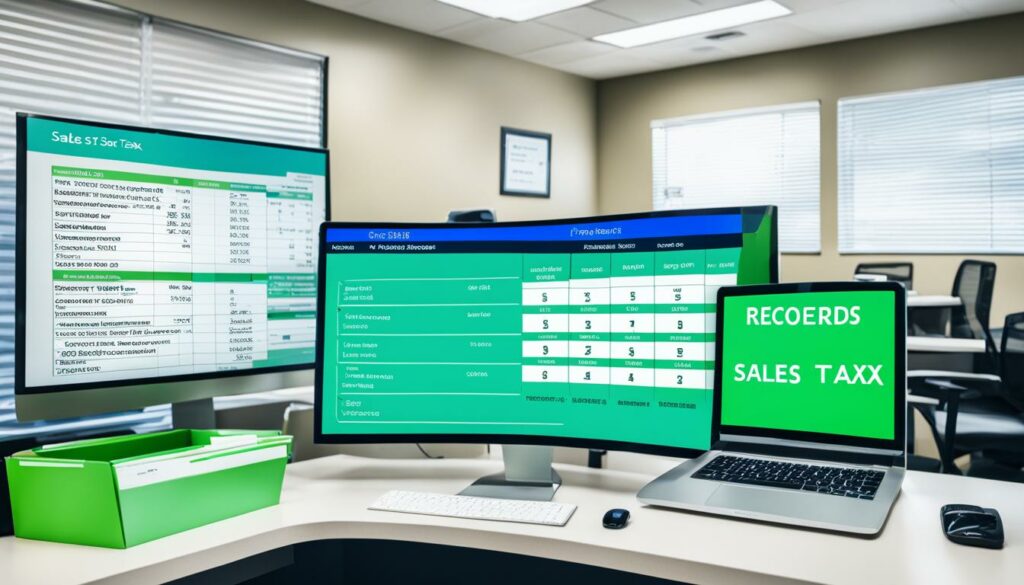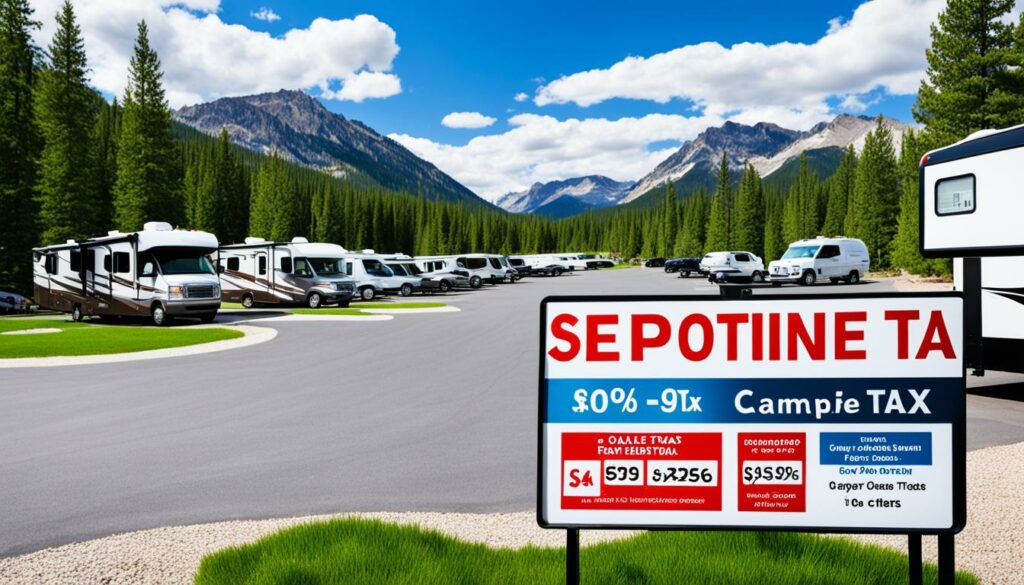As an RV park owner, navigating the labyrinth of sales tax management is as crucial as ensuring your guests enjoy their stay. In the ever-evolving tax landscape, staying in step with state and federal tax laws is not just about diligence—it’s about survival. Gone are the days of simple ledger books and annual check-ins with your accountant; robust RV park tax compliance today hinges on a sophisticated blend of knowledge and technology.
Understanding the intricacies of RV park tax reporting and the ways to utilize tax software for RV park sales tax can protect your business from costly penalties and keep your financial foundation secure. Your journey to mastering sales tax management for your RV park starts now, as we unfold the best practices to help you navigate these complex waters with confidence and precision.
Effective tax compliance is less about number-crunching and more about strategic planning. Let’s explore the methods that can streamline your processes, keep you ahead of law changes, and free you from the tangles of tax red tape.
Key Takeaways
- Adopt and integrate advanced tax software designed for RV park sales tax to enhance accuracy and efficiency.
- Maintain vigilant RV park tax reporting practices to sidestep potential fines and penalties.
- Keep abreast of changes in sales tax laws to ensure your RV park remains within compliance.
- Leverage professional advice and tools to establish a resilient tax compliance framework.
- Understand the importance of training your staff in the fundamentals of sales tax collection and reporting for smooth operations.
Understanding the Basics of Sales Tax for RV Parks

As you delve into the realm of running a successful RV park, it’s imperative to grasp the rudiments of Sales Tax Management for RV Parks. There’s more to it than just charging your customers; it involves discerning which services are taxable and how tax rates are established across different jurisdictions. This fundamental know-how forms the bedrock of your business’s fiscal health and ensures you remain compliant with the nuanced tax laws.
What Constitutes Sales Tax in RV Park Transactions
Understanding what triggers a sales tax obligation in your RV park operations is crucial. The sales tax generally applies to the rental of space, but it may also extend to certain additional amenities you offer. Many states require RV parks to collect sales tax on the overnight or long-term accommodation they provide. However, by obtaining insightful RV park tax advice, you can pinpoint which specific transactions within your operations are taxable, thereby dodging any unintended evasion of tax duties.
How Sales Tax Rates are Determined for RV Parks
Don’t let varied sales tax rates become your downfall. The rate applied can differ vastly depending on whether your RV park is located in a bustling city or a serene rural area. These rates are often a combination of state, county, and city tax percentages. Consequently, ensuring that you’re charging the correct amount requires due diligence and an understanding of the governing laws within your locale.
Identifying Taxable Services in RV Park Operations
While the lease of a space might be clearly taxable, what about Wi-Fi access, electricity hookups, or laundry facilities? Some ancillary services provided by RV parks might also be subject to sales tax. Determining which of these services are taxable demands a methodical approach. Every service should be scrutinized under state laws to verify its taxability, solidifying your stance in Sales Tax Management for RV Parks and safeguarding against legal repercussions that can arise from tax misapprehensions.
Sales Tax Management for RV Parks

Mastering the intricacies of sales tax solutions for RV parks is integral to the financial health and compliance of your RV resort. With various states imposing different tax rates and rules, the complexity of sales tax management can be overwhelming. However, by leveraging RV park tax automation, you can simplify the process, ensure accuracy, and save valuable time.
One of the first steps toward effective tax management is the implementation of advanced tax software. These systems can autonomously handle the calculation of taxes, integrate with your booking platform, and keep a real-time record of all transactions. The benefits extend beyond mere convenience; they help in minimizing human error and providing detailed reports that are crucial during tax season.
Even with advanced software at your disposal, there may be scenarios that require specialized insight. That’s where RV park tax consulting services come into play. Consultants with experience in the RV park industry can offer tailored advice to ensure you’re not only meeting current tax obligations but are also optimally positioned for changes in legislation.
Automating your sales tax processes doesn’t just cut down on errors; it provides peace-of-mind that your RV park is financially compliant and secure.
- Invest in reputable tax software specifically designed for RV parks.
- Understand the functionality and benefits of tax automation in reducing laborious tasks and human error.
- Consider hiring a tax consultant with specialization in RV parks to help navigate complex tax scenarios.
- Stay updated on sales tax laws which may affect your RV park directly, including exemptions and varying tax rates.
- Review the tax reports generated by your software regularly to ensure complete and correct data.
With conscientious application and savvy use of technology, managing sales taxes can become a streamlined component of your RV park operation. It frees you to focus more on guest satisfaction and less on the numbers, all the while ensuring that you stay within the lines of legislative requirements.
RV Park Tax Compliance Strategies

Navigating tax compliance can seem daunting for RV park owners, but with the right strategies in place, it can become a streamlined and less taxing process. Keeping a tight ship when it comes to financial records, staying informed of legislative changes, and ensuring your team is well-versed in tax collection will go a long way in maintaining sound sales tax management for your RV park.
Maintaining Accurate Financial Records
To keep your RV park financially healthy and compliant, meticulous record-keeping is a must. By leveraging sales tax management tools for RV parks, you can automate and simplify the tracking of sales and tax data. Accuracy in financial records ensures that compliance is met and any audits are smoothly navigated.
Staying Informed on Sales Tax Law Changes
Changes to sales tax laws can happen frequently, and keeping up-to-date with these changes is a cornerstone of RV park tax compliance. It is imperative to continually educate yourself and utilize resources like statewide newsletters or tax law summaries to stay informed on these crucial modifications that may impact how you manage your park’s finances.
Training Staff on Proper Tax Collection Procedures
Proper training of your staff on tax collection procedures cannot be overstated. Well-trained employees ensure that sales are recorded and taxed correctly at the point of transaction. This is especially important in an industry where various rates may apply based on the facilities and services offered by your RV park.
| Strategy | Impact on Compliance | Tools/Resources |
|---|---|---|
| Accurate Record-Keeping | Reduces audit risks and financial discrepancies | Tax management software, digital bookkeeping |
| Up-to-Date Tax Law Knowledge | Ensures current procedures align with latest regulations | Seminars, webinars, tax law summaries |
| Staff Tax Collection Training | Increases accuracy in daily transactions | Instructional sessions, role-playing exercises |
Putting these RV park tax compliance strategies into practice will not only mitigate the risk of financial penalties but will also contribute to the overall efficiency and reputation of your RV park. Stay diligent, informed, and proactive about your tax responsibilities to ensure smooth sailing ahead.
Choosing the Right Tax Software for RV Park Sales Tax
Ensuring that your RV park adheres to sales tax regulations is critical for operational success and legal compliance. The backbone of streamlined tax reporting is choosing efficient tax software for RV park sales tax. This pivotal business tool must not only deliver precision and ease of use, but also seamlessly synchronize with your existing RV resort’s infrastructure.
Evaluating Tax Software Features
When selecting tax software, it is essential to assess key features that address the specific needs of RV park sales tax handling. Look for robust functionality that supports varied tax rates and can handle the layering of state, county, and local taxes. Furthermore, the best tax software solutions offer regular updates to ensure that your reporting stays compliant with the latest tax laws. Consider the following features:
- Accurate Tax Calculations: To minimize errors, software must precisely calculate taxes on every transaction.
- Automated Tax Reporting: High-quality software will feature automated generation of reports, aiding in efficient RV park tax reporting.
- User-Friendly Interface: An intuitive user interface expedites training and daily operations.
- Cloud-based Access: Access to sales tax data and functionality from any location is invaluable for the mobile nature of RV park management.
- Customer Support: Reliable customer service is a cornerstone of any software solution, ensuring assistance is at hand should you encounter any issues.
Integration with Your Existing RV Park Management System
The next critical step in choosing tax software for your RV park is ensuring that the solution integrates effectively with your current management system. An integrated system creates streamlined processes, eliminates the need to manually enter data across different platforms, and reduces the risk of human error. A seamless connection between your management software and tax calculation tool provides:
- Centralized Operations: Integrated software centralizes operational tasks making your business more efficient.
- Real-time Data Syncing: Integrations allow for real-time updates across all your systems, ensuring that tax calculations are based on the latest information.
- Improved Data Integrity: This synchronization minimizes inconsistencies in reporting and record-keeping.
By prioritizing these crucial aspects of tax software, you position your RV park for successful navigation of the complexities in sales tax management. Remember, the right tools not only simplify tax compliance but also contribute to your RV park’s overall financial health and reputation.
Streamlining Your RV Park Tax Reporting Process

Efficient management of your RV park’s financial obligations begins with a strong tax reporting system. By incorporating RV park tax automation and setting a regular reporting schedule, you can reduce errors and maintain timely submissions. These measures not only ensure compliance but also allow you to focus on enhancing your guests’ experience.
Automated Reporting Tools
Embracing advanced reporting tools that offer sales tax solutions for RV parks can significantly streamline tax management. Automated systems designed for RV park tax reporting systematically record, calculate, and file necessary information with precision. This level of automation not only saves time but also drastically cuts down on manual errors that could lead to costly penalties. A robust setup can include features like real-time transaction tracking, automatic tax rate updates tailored for specific jurisdictions, and integrations with payment gateways.
Regular Reporting Schedule
Maintaining a regular cycle for your tax reporting is vital. Consistent schedules prevent the buildup of data and allow for regular oversight, keeping your financials in check. Adhering to such routines fosters an environment of proactive management, ensuring that you’re prepared when tax deadlines approach. Below, find a comparative table that outlines the benefits of aligning to a routine reporting system as opposed to ad-hoc methods.
| Reporting Method | Benefits | Potential Risks |
|---|---|---|
| Regular Reporting Schedule |
|
|
| Ad-Hoc Reporting |
|
|
Incorporating RV park tax automation and observing a disciplined reporting schedule can have a transformative effect on your business’s tax management efficiency. With these tools in place, you can confidently handle your fiscal responsibilities and ensure that your RV park thrives in a demanding market.
RV Park Tax Automation: Saving Time and Reducing Errors
When it comes to sales tax management, RV park tax automation is a game changer. Gone are the days of manually updating spreadsheets and double-checking figures for errors—advanced technology can now streamline your processes, lead to better accuracy in your records, and significantly reduce the risk of errors. Automating your tax procedures can transform the financial management within your RV park, saving you both time and effort.
But what does automating your tax systems involve? Essentially, sales tax management tools for RV parks go hand in hand with software solutions designed to handle the intricacies of tax reporting and compliance. They work by syncing with your existing financial systems to calculate, track, and report on sales tax without requiring manual input at every turn.
Consider the significant benefits an RV park can reap from embracing tax automation:
- **Improvement in accuracy**: Prevent human error by allowing software to compute and file taxes.
- **Time efficiency**: Reduce the hours spent on tax management, allowing you to focus on other aspects of your business.
- **Regulatory compliance**: Stay up-to-date with the latest tax laws and ensure compliance through automated updates.
- **Financial oversight**: Enhance your ability to monitor and review financial data through detailed, automated reports.
- **Reduced audit risk**: Precision through automation means lower chances of discrepancies during audits.
With the integration of these tax tools, you can secure peace of mind knowing that your RV park is not only running efficiently, but also in line with legal requirements. As a responsible RV park owner, investing in RV park tax automation could be one of the most strategic business decisions you make—setting your park on a path of modernized financial management.
Automated tax solutions offer a clear path to ensuring accuracy, saving time, and maintaining compliance with changing tax laws. No wonder more and more RV parks are seeking out sales tax management tools for an edge in today’s competitive market.
Adopting sales tax management tools for RV parks is more than just a luxury; it’s becoming a necessity in an industry where financial precision is as important as guest satisfaction. Make sure you’re not left behind in harnessing the power of automation to secure your park’s future.
Implementing Sales Tax Solutions for RV Parks
For RV park owners, tax season need not be a time of stress. With the right sales tax solutions for RV parks, you can streamline your financial operations and ensure that your park remains compliant with the latest tax regulations. The key is to choose a system that suits the complex needs of the RV park industry and provides simplicity and reliability for your business.
How to Choose a Sales Tax Solution That Fits Your RV Park
Selecting the correct sales tax solution starts with identifying your RV park’s specific needs. Whether you are managing a small, family-owned site or a large, franchised park, the system you choose must be capable of handling transactions accurately in real time and must be updated with all the various tax rates of the states and municipalities in which you operate. Here are some factors you should consider when making your choice:
- Capability to handle multi-jurisdictional tax rates
- Ease of integration with your current reservation and accounting systems
- Availability of customer support to assist with any questions or issues
- Provisions for scalability should your park expand in the future
- User reviews and testimonials to gauge the solution’s effectiveness in real-world scenarios
Choosing the right solution will afford you more time to focus on providing excellent guest experiences rather than being bogged down with tedious tax calculations and compliance concerns.
The Role of Sales Tax Consultants for RV Parks
While technology can provide powerful sales tax solutions for RV parks, the human element should not be overlooked. RV park tax consulting professionals bring a wealth of industry-specific knowledge and experience. They can offer invaluable guidance on a wide range of issues, from identifying the correct taxable items to understanding the implications of state and local tax laws on your operations. Consultants can provide services such as:
- Detailed assessments of your sales tax liabilities
- Advice on tax exemption qualifications and applications
- Auditing services to ensure you are not overpaying or underpaying taxes
- Up-to-date information on legislative changes that might affect your business
- Assistance during tax audits and negotiations with tax authorities
Engaging with a consultant can be particularly critical when navigating complex circumstances or when facing audit challenges. Their expertise can lead to substantial savings and help you establish best practices that ensure long-term compliance and stability.
Implementing sophisticated sales tax solutions for RV parks and partnering with expert tax consultants can significantly improve your RV park’s financial workflows. By taking proactive steps to address sales tax concerns, you can ensure your park operates within the bounds of the law, thereby averting potential legal issues and focusing on delivering outstanding service to your guests.
Expert RV Park Tax Advice: When to Seek Help
Navigating the complexities of sales tax for your RV park can be intricate and often requires expert knowledge. Recognizing when to seek RV park tax advice is essential for maintaining compliance and the financial health of your business.
Dealing with the multifaceted issues of sales tax management can present several challenges. It is beneficial to consider professional RV park tax consulting to tackle these difficulties effectively.
Common Sales Tax Issues for RV Parks and How to Address Them
Issues such as determining the taxability of various services, keeping up with multiple jurisdiction tax rates, and understanding your obligations under the law are common hurdles. Here are some of the common challenges that RV park owners may face:
- Complexities in taxing additional amenities beyond space rental
- Varying sales tax rates from city to state level regulations
- Changes in sales tax legislation that affect RV park operations
- Correctly managing exemption certificates for qualifying customers
Professional tax advisors can aid in addressing these issues through personalized RV park tax advice, ensuring that you’re not only compliant but also capitalizing on potential tax benefits.
Partnering with Tax Professionals
Building a relationship with tax professionals who specialize in the RV park sector can be invaluable. These experienced can provide customized strategies and solutions tailored to the unique needs of your business.
| Services Offered by Tax Professionals | Benefits to Your RV Park |
|---|---|
| Regular tax compliance checks | Ensures ongoing adherence to sales tax laws |
| Identification of applicable tax exemptions | Reduces overpayment and enhances savings |
| Assistance with audit preparation and defense | Minimizes risk and stress associated with audits |
| Updates on changing sales tax regulations | Keeps your RV park ahead of legislative updates |
| Training for your staff on tax procedures | Enhances in-house handling of sales tax matters |
Recognize when complex sales tax matters are beyond internal capabilities and when RV park tax advice and RV park tax consulting become necessary. Rely on professionals to provide the expertise required for achieving accurate and strategic sales tax management, safeguarding the financial integrity of your RV park.
Conclusion
As we wrap up this journey through the nuanced territory of Sales Tax Management for RV Parks, it’s clear that the key to successful RV park tax compliance lies in embracing the best practices that streamline taxation processes. The use of tax software for RV park sales tax isn’t just a technological upgrade; it’s an essential part of ensuring accuracy, efficiency, and adherence to the ever-changing tax laws. Integrating these innovative tools into your RV park’s operation is a testament to your commitment to both excellence and legal conformity.
Best Practices Recap for RV Park Sales Tax Management
Let’s reiterate the vital best practices crucial for maintaining comprehensive sales tax oversight. Develop a robust understanding of your tax liabilities, automate tax calculations, and maintain meticulous financial records. Keep your staff well-informed with regular training on the latest tax collection procedures and remain proactive by staying updated on legislative changes that can impact your RV park’s finances. Additionally, consider partnerships with tax consultants when complexities exceed in-house expertise.
Next Steps in Optimizing Your Tax Management Strategy
The path forward involves a commitment to continual optimization of your tax management strategy. Engage in an ongoing evaluation of your tax software to ensure it meets the evolving demands of your business and the industry. Prepare for the future by adopting scalable sales tax solutions that grow alongside your RV park. By doing so, you maintain not just compliance, but also the agility to navigate the financial intricacies with confidence, ensuring your RV park’s operations remain seamless and guest-focused.
FAQ
What factors contribute to the complexity of managing sales tax in RV park operations?
Several factors contribute to the complexity of managing sales tax for RV parks including varying tax rates across jurisdictions, differentiations between taxable and nontaxable services, and the nuances of state and local tax laws. Adopting best practices and leveraging tax software can help streamline tax compliance and reporting.
How do RV parks determine the sales tax rate for their transactions?
Sales tax rates for RV parks are determined by local and state tax jurisdictions where the park is located. It is important to research and understand these rates, as they can vary significantly depending on the region and specific services offered.
What are some examples of taxable services in RV park operations?
Taxable services in RV parks can include overnight lodging, rental of spaces, usage of park facilities, and additional amenities provided to guests. Knowing which services are subject to sales tax is essential for RV park tax compliance.
Why is it necessary to automate sales tax management in RV parks?
Automating sales tax management helps RV parks reduce manual errors, save time, and ensure accuracy in tax calculations and filings. RV park tax automation, using advanced software, ensures consistent compliance with tax regulations.
What practices are essential for maintaining sales tax compliance in an RV park?
Essential practices for RV park tax compliance include maintaining accurate financial records, staying informed of changes in sales tax laws, and training staff on proper tax collection procedures. These strategies minimize legal risks and ensure consistent fulfillment of tax obligations.
How should RV parks evaluate tax software for their sales tax needs?
When evaluating tax software for RV park sales tax, consider the software’s features such as ease of use, integration capabilities with existing management systems, automated reporting tools, and customer support. It should align with the park’s specific operations and reporting needs.
What benefits do automated reporting tools provide for RV park tax reporting?
Automated reporting tools benefit RV parks by facilitating efficient and timely tax reporting, minimizing human error, and providing accurate documentation for tax filings. This helps to streamline the tax reporting process, making it more manageable for park owners.
How can RV parks streamline their tax reporting process to improve efficiency?
RV parks can streamline their tax reporting process by adopting automated tools, maintaining a regular reporting schedule, and ensuring that systems are in place for accurate data collection and financial analysis. Consistency in these practices leads to improved efficiency and reliability in tax management.
What role do sales tax consultants play for RV parks?
Sales tax consultants provide specialized knowledge and advice tailored to the RV park industry. They can help with complicated tax issues, ensuring that park owners meet all compliance requirements and optimize their sales tax management strategy.
When should an RV park owner seek expert tax advice?
An RV park owner should seek expert tax advice when facing complex tax challenges, if there’s uncertainty about compliance, or when updating systems to automate tax processes. Professional consultants can offer insights and solutions that align with the park’s specific needs.





